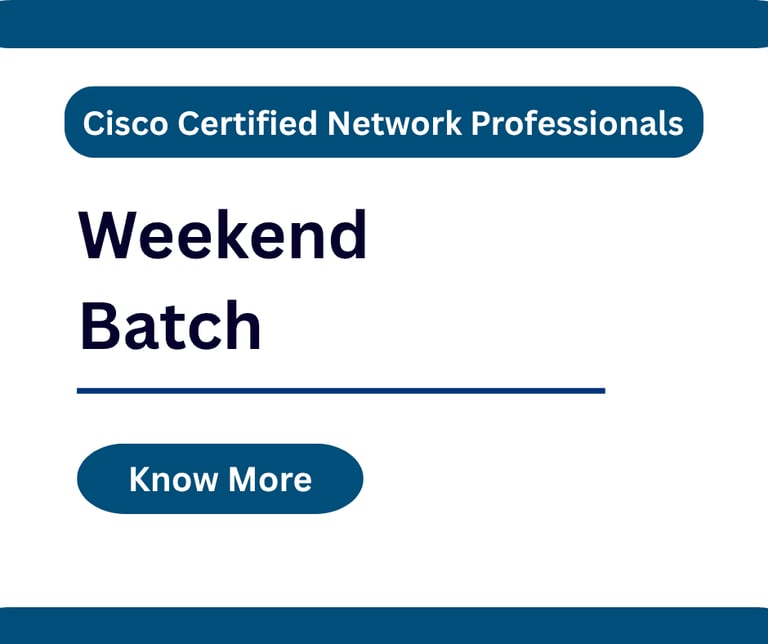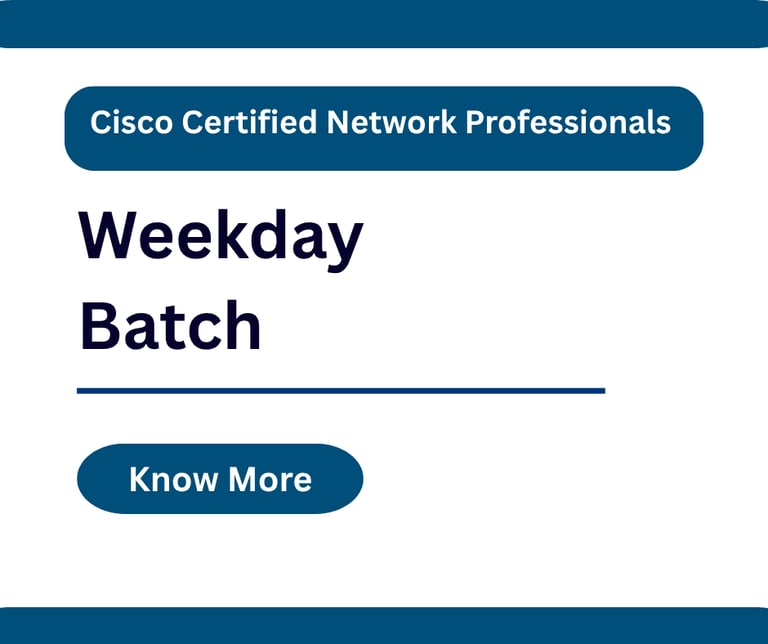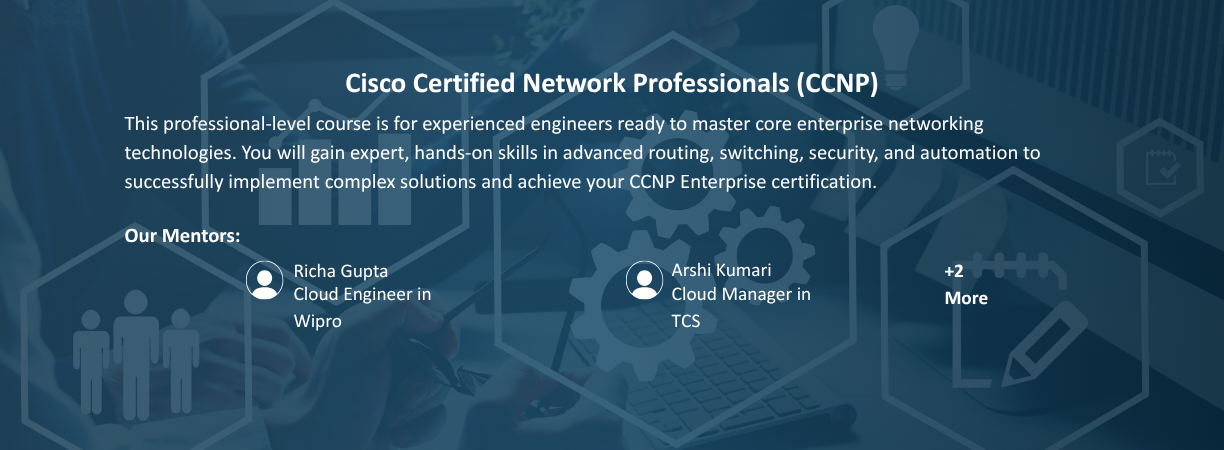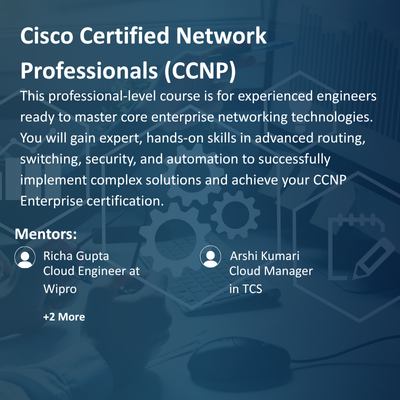







Major Industry Recruiters








Major Industry Recruiters
Course Description:
This is a professional-level course designed for experienced network engineers ready to master the core technologies of enterprise networks. Through in-depth lectures, hands-on lab exercises, and real-world case studies, you will learn to implement, manage, and troubleshoot complex enterprise networking solutions for modern infrastructures. The course covers advanced routing, switching, security, network services, virtualization, and the fundamentals of network automation and programmability, preparing you for the Cisco Certified Network Professional (CCNP) Enterprise certification.
Course Objective:
Upon completion of this CCNP Enterprise training, students will be able to:
1. Design & Core Implementation
Implement and verify complex enterprise-level architectures, including three-tier, spine-leaf, and Cisco SD-WAN/SD-Access concepts, and advanced WLAN deployment models.
Configure and manage network path virtualization technologies such as VRF, GRE, and IPsec Tunneling.
Deploy and troubleshoot high-availability infrastructure services, including Advanced Spanning Tree Protocols (MSTP) and First Hop Redundancy Protocols (HSRP, VRRP, GLBP).
2. Advanced Routing & Path Control
Implement and fine-tune advanced routing protocols, including Multi-area OSPF/EIGRP (named mode, tuning, summarization) and basic BGP (eBGP).
Perform complex Route Redistribution between disparate routing protocols (EIGRP, OSPF, BGP).
Implement and enforce traffic forwarding decisions using Path Control tools like Policy-Based Routing (PBR) and Cisco Express Forwarding (CEF).
3. Security, VPNs, & Infrastructure Services
Implement and verify secure device access using AAA (RADIUS/TACACS+) and configure infrastructure security features like ACLs and Control Plane Policing (CoPP).
Configure and troubleshoot advanced VPN solutions, including GRE Tunnels and Dynamic Multipoint VPN (DMVPN) with IPsec.
Implement network-wide IP Services such as QoS, Multicast (PIM-SM/DM), and configure precise time synchronization using NTP.
4. Network Assurance & Automation
Apply a systematic, ITIL-compliant troubleshooting methodology to isolate and resolve complex Layer 2, Layer 3, redistribution, and VPN connectivity faults.
Utilize advanced network assurance and monitoring tools, including SNMP, Syslog, NetFlow, and SPAN/RSPAN/ERSPAN.
Describe and utilize the fundamentals of network automation, including Python scripting, interpreting JSON/XML data, and configuring devices via NETCONF and RESTCONF.
Course Module:
The course is typically split into two major sections, mirroring the two required exams.
1. Enterprise Core Technologies (350-401 ENCOR Focus)
This section focuses on core knowledge, preparing you to design and manage enterprise-level networks.
Network Architecture
Cisco Enterprise Network design principles (Tier-2, Tier-3, Spine-leaf).
WLAN deployment models and location services.
Understanding the concepts of Cisco SD-WAN and SD-Access solutions.
Virtualization
Device virtualization technologies (Hypervisors, VMs).
Network Path Virtualization (VRF, GRE, and IPsec Tunneling).
Infrastructure
Advanced Spanning Tree Protocols (RSTP, MSTP, PVST+).
High Availability technologies (HSRP, VRRP, GLBP).
Advanced OSPF and EIGRP (Multi-area, tuning, summarization).
Implementing and verifying basic BGP (eBGP).
IP Services (NAT, QoS, Multicast).
Network Assurance
Network monitoring and troubleshooting tools (show and debug commands, SNMP, Syslog, NetFlow).
Configuring SPAN/RSPAN/ERSPAN and IPSLA.
Cisco DNA Center workflows and device management.
Security
Device access control (AAA, RADIUS, TACACS+).
Infrastructure security features (ACLs, CoPP).
Fundamentals of wireless security (WPA2/WPA3).
Automation
Basic Python components and scripting.
Interpreting JSON and XML data formats.
High-level principles and benefits of data modeling (YANG).
Using NETCONF and RESTCONF for device configuration.
2. Enterprise Advanced Routing and Services (300-410 ENARSI Focus)
This section provides a deep dive into advanced routing, infrastructure services, and troubleshooting.
Advanced Routing Implementation
Detailed configuration and verification of EIGRP (named mode, authentication).
Advanced OSPF concepts (LSA types, route filtering, path selection).
Implementing Route Redistribution between different routing protocols (EIGRP, OSPF, BGP).
Implementing Path Control using technologies like Policy-Based Routing (PBR) and Cisco Express Forwarding (CEF).
VPN Technologies
Configuring and verifying GRE Tunnels (Generic Routing Encapsulation).
Implementing and verifying advanced VPN concepts like DMVPN (Dynamic Multipoint VPN).
Understanding and configuring IPsec for secure VPN connections.
Infrastructure Services
Advanced FHRP (First Hop Redundancy Protocols) configuration.
Detailed configuration and troubleshooting of NTP (Network Time Protocol).
Understanding and implementing Multicast concepts (PIM-DM, PIM-SM, IGMP).
Advanced security features (CoPP, Control Plane Policing).
Troubleshooting
Applying a systematic ITIL-compliant troubleshooting methodology.
Troubleshooting complex Layer 3 and Layer 2 connectivity issues.
Troubleshooting issues related to redistribution, path control, and VPNs.
Using advanced diagnostic tools and logs to isolate and resolve network faults.
Course Overview:

Upcoming Batches: Choose as per Your Requirement




Our Mentors:
Richa Gupta
Cloud Engineer in Wipro
Arshi Kumari
Cloud Manager in TCS
Ahmed Khan
Cloud Engineer in Cognizant
Abhishek Singh
Cloud Engineer in IBM
Our Mentors:
Richa Gupta
Cloud Engineer in Wipro
Aina Rathor
DevOps Engineerex-Deloitte
Ahmed Khan
Coud Engineer in Cognizant
Coud Engineer in IBM
Abhishek Singh
Our Alumni Work at Top Companies
FAQs – Cisco Certified Network Professional at GIMIT
1) Who is the ideal target audience for the CCNP Enterprise course?
This course is designed for experienced IT professionals seeking a professional-level certification, including Network Engineers, Senior Network Administrators, Network Architects, and individuals with a minimum of 3-5 years of hands-on networking experience.
2) What prerequisites are required before enrolling in this course?
A strong working knowledge of networking fundamentals is essential. It is highly recommended that students possess expertise equivalent to the CCNA certification to succeed with the advanced, professional-level topics.
3) Which Cisco certification exams does this training prepare me for?
This course directly aligns with the two required exams for the CCNP Enterprise certification:
350-401 ENCOR (Core Technologies)
300-410 ENARSI (Advanced Routing and Services) or an equivalent concentration exam.
4) What is the main goal of the CCNP Enterprise certification?
The course goal is to validate your ability to plan, implement, verify, and expertly troubleshoot complex wide-area and local-area enterprise networks, proving your mastery of advanced enterprise networking solutions.
5) How much emphasis is placed on advanced routing protocols?
Advanced routing is a major focus (ENARSI section). You will gain in-depth configuration and verification skills for Multi-area OSPF/EIGRP, implementing Route Redistribution, basic BGP (eBGP), and enforcing network policies using Path Control.
6) Does the course cover network automation and programmability?
Yes, the course covers the fundamentals of automation, including basic Python scripting, interpreting JSON and XML data formats, and using protocols like NETCONF and RESTCONF for device configuration and management.
7) What advanced security and VPN technologies are included?
You will learn to implement robust security features like AAA (RADIUS/TACACS+), Control Plane Policing (CoPP), and configure advanced VPN solutions such as GRE Tunnels and DMVPN (Dynamic Multipoint VPN).
8) Will I learn to troubleshoot complex network issues?
Yes. A significant portion of the course focuses on systematic, ITIL-compliant troubleshooting methodologies to diagnose and resolve complex faults related to Layer 2, Layer 3, VPNs, and routing redistribution failures.
9) What is the training methodology—is it mostly lecture or hands-on?
The course uses a balanced methodology of in-depth lectures, extensive hands-on lab exercises, and analysis of real-world case studies to ensure practical mastery and application of complex concepts.
10) What career roles can I pursue after achieving the CCNP Enterprise certification?
CCNP validates skills for senior roles such as Senior Network Engineer, Network Architect, or Network Team Lead, positioning you for higher responsibility and salary in the IT industry.





